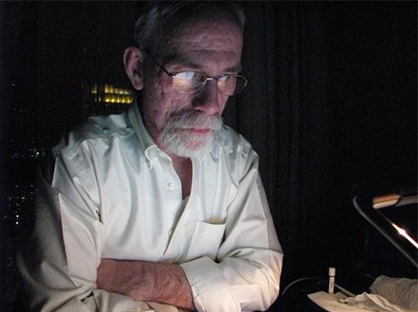Mark Andrews, 66, of Branford, Connecticut was on a fast track in his chosen career as a photographer, earning advanced degrees in visual arts from Syracuse University and Goddard College, eventually landing jobs working on photo shoots and producing commercials for a growing list of national and global clientele. As a visual artist, Andrews was sought after for his abilities to tell a story through his lens.
Andrews' life changed in 2017 after being diagnosed with cancer for which he underwent chemotherapy. Following successful treatment, he was given a favorable prognosis. Within a few short months, Andrews began noticing issues with his eyesight after several near-accidents while driving. "Cars seem to be coming at me from out of nowhere. I had no peripheral vision,” Andrews explained. “After multiple near-misses behind the wheel, I realized there was something wrong."
Andrews was suffering from autoimmune retinopathy (AIR), a disease in which the patient's immune system attacks proteins in the retina, leading to loss of eyesight. AIR is thought to be a rare side effect of chemotherapy.
As Andrews' eyesight began to deteriorate, simple tasks like navigating doorways, stairs, and just reading his mail turned into a puzzle. As his condition progressed, Andrews recalled staying awake many nights simply to memorize his surroundings - including family member's faces - knowing that each day may be the last time he sees people and objects. "My eyesight was my livelihood, my profession," said Andrews. "I built my life around my gift to see the intricacies of the world differently than others and capture those moments through photography. I no longer knew where I belonged or what I would do."
Andrews admitted to struggling with despair and depression during the first few months of his vision loss, crediting his family and his sense of humor about the irony of his situation to get by. "I guess someone 'pictured things' differently for me," quipped Andrews.
Andrews is among the growing number of those who have turned to Hadley.edu to help navigate life following his vision loss. Hadley, a 501(c)(3) non-profit organization is the nation's oldest and largest provider of free distance and online learning for adults with vision loss. Recently Hadley has experienced a surge in enrollment for workshops, podcasts, and discussion groups designed to keep the visually impaired connected to expert help during the pandemic, including new learning modules for those with vision loss on how to use Zoom, as well as how to access special low vision features on their cell phones, smart devices, and computers.
Andrews learned about Hadley through a State of Connecticut caseworker who helped him identify resources. "I think there is a misperception about the needs of those who experience vision loss later in life," explained Andrews. "It's great that there are classes for braille and using a cane, but I needed help with simple things like tying my shoes, navigating in public, and getting around my kitchen. Hadley offered these practical workshops for those new to vision loss. It was like learning to walk all over again. I am using low vision features on my cell phone and computer that I never knew existed."
Through his own personal experience, Andrews was recently recruited by Hadley to serve a role in assisting other low vision individuals as part of a group of advisors chosen to provide input for the design and implementation of the new Hadley.edu, which takes a dramatically different approach to reaching an audience that is becoming increasingly difficult to reach, primarily older adults facing vision loss. Built on many months of research and development work, the new platform is entirely based on the needs and wants of visually impaired adults to keep them connected, engaged, and informed.
"Fortunately, the new Hadley.edu contains thousands of things that if you didn't have low vision, you would never think about,” said Andrews. “I was honored to contribute to the development of this vitally important resource. Hadley gave me my independence back, if my input helps others like me, then I feel like I made a real difference."
